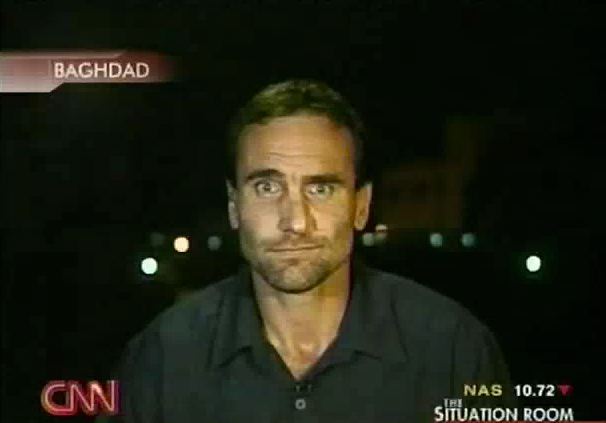TSR: "...there's always a heavy caveat."

Click photo to play
Length: 4:09
WOLF BLITZER: Back now to the shifting strategy and the shifting timetable for the war in Iraq. Top U.S. officials are urging Iraqis to take responsibility for their own security within the next year and a half. That's not linked to a U.S. troop withdrawal but our latest poll suggest Americans are looking for such a link. Fifty seven percent of those polled say they favor setting a timetable for a pullout, 40 percent say they're opposed.
And joining us now from Baghdad, our correspondent, Michael Ware. Michael, we heard the U.S. Military Commander General Casey suggest today it could take another 12 months to 18 months for Iraqi troops to be positioned to take charge of their own security. Is that -- based on what you've seen on the ground, and you've been there on and off for more than three years -- is that realistic?
WARE: Well, Wolf, I think you put it best when you said that General Casey suggested that the Iraqi security forces might be capable of defending themselves in 12 to 18 months. The word he used in the press conference was "I believe." There was no clear commitment on this. Whilst on one hand yes it does spell out some kind of time frame, which may be a useful mechanism for measuring developmental progress in a very lose way.
On the other hand, Wolf, we've heard this so many times before. We've had so many other deadlines or time frames stated, slip and pass us by that honestly the statement today is almost meaningless, because there's always a heavy caveat.
Not only is it just a belief by the commander on the ground here, but it's also as always conditions-based. U.S. troops can't withdraw on any given date unless the situation on the ground permits, and that's implicit I believe in General Casey's statement today -- Wolf.
BLITZER: Do these words, though -- suggesting a timeline, suggesting that the United States wants the Iraqi government to meet certain benchmarks along this timeline -- is it likely to have an impact on this Iraqi government, which seems so fragile to begin with in forcing them to deal with these death squads and these militias?
WARE: Well, the U.S. is clearly ramping up the pressure, Wolf. I mean they want to see results. They've bet the house on Prime Minister Maliki, whom one of his most senior security people today privately admitted to me or confirmed to me, has relatively little power within the government and relies primarily on the American forces for any kind of muscle.
And if it's not the American forces, he's looking to Muqtada al-Sadr and his Jaish al Mahdi, whose political support helped land him as the compromise candidate for the prime minister. There's very little that Maliki can force through. Now we heard Ambassador Khalilzad say that essentially the Iraqi government -- Maliki -- has agreed to agree on a timeline by the end of the year.
So we need to be very careful of the words here. And as we saw the White House spokesman say just yesterday, even when it comes to the end of the year, the U.S. is not making any ultimatums. Quite frankly, it's got very little to back up any ultimatum -- Wolf.
BLITZER: One final question, we don't have a lot of time, Michael. This Balkan option, dividing up Iraq into three separate parts -- a Kurdish part in the north, a Shiite part in the south and a Sunni part sort of in the central -- the White House says that's a nonstarter. What are they saying where you are?
WARE: Oh, absolutely, it's a nonstarter. I mean, to fracture this state like this would have drastic domestic implications and regional implications. And this issue touches upon so many others that Ambassador Khalilzad and General Casey referred to today. From the equal distribution of oil revenues to the Sunni insurgency to Iran to the militias. I mean, this very much is just the tip of a massive iceberg. Wolf?
BLITZER: All right, Michael, thanks very much. Michael Ware reporting for us from Baghdad.
